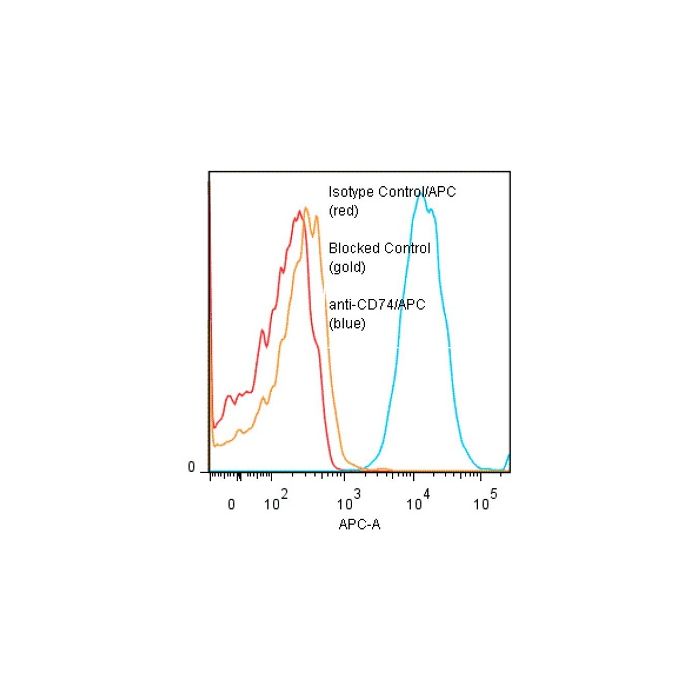Cookie Policy: This site uses cookies to improve your experience. You can find out more about our use of cookies in our Privacy Policy. By continuing to browse this site you agree to our use of cookies.
Ancell
anti-CD74 (human), mAb (M-B741) (APC)
As low as
634
CHF
CHF 634.00
In stock
Only %1 left
ANC-226-060120 testsCHF 634.00

Figure 1: Binding of anti-CD74/APC to human Raji cells. Method: Five x 10^5 cultured Raji human tumor cells were washed and incubated 45 minutes on ice with 80 µl of anti-CD74/APC at a 1:50 dilution (10 µg/ml). Cells were washed twice, fixed and analyzed by FACS. Cells stained positive with a mean shift of 1.65 log10 fluorescent units when compared to Isoptype Control Mouse IgG2a/APC (#ANC-281-060). Binding was blocked when cells were pre-incubated 10 min with 20 µl of 0.5 mg/ml anti-CD30 antibody (#ANC-179-020).
| Product Details | |
|---|---|
| Synonyms | HLA Class II Histocompatibility Antigen Gamma Chain |
| Product Type | Monoclonal Antibody |
| Properties | |
| Clone | M-B741 |
| Isotype | Mouse IgG2a |
| Immunogen/Antigen | RPMI 1788 cell line. |
| Label/Conjugates | APC |
| Application |
Flow Cytometry |
| Crossreactivity | Human |
| Specificity |
Antibody clone M-B741 recognizes the human CD74 molecule. |
| Purity | Protein A purified. |
| Formulation | 50 mM Sodium Phosphate pH 7.5, 500 mM Potassium Chloride, 150mM NaCl, 15% Glycerol, 0.2% BSA, 0.04% NaN3 (as a preservative). |
| Other Product Data |
Click here for Original Manufacturer Product Datasheet |
| Declaration | Manufactured by Ancell Corporation. |
| Shipping and Handling | |
| Shipping | BLUE ICE |
| Short Term Storage | +4°C |
| Long Term Storage | +4°C |
| Handling Advice |
Do not freeze. Protect from light. |
| Use/Stability | Stable for at least 1 year after receipt when stored at +4°C. |
| Documents | |
| Product Specification Sheet | |
| Datasheet |
 Download PDF Download PDF |
Description
Human CD74 is expressed intracellularly and on the cell surface of MHC Class II positive cells such as B cells, monocytes, macrophages, Langerhans cells and dendritic cells. CD74 has several important functions relating to antigen presentation by MHC Class II molecules.






